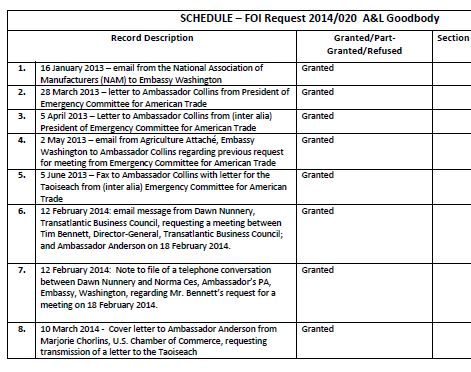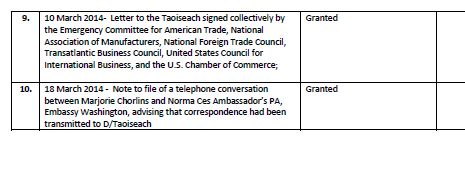Emergency Committee for American Trade
This page was last edited on at
Founded in 1967 by a number of American business leaders, the Emergency Committee for American Trade aims to “promote economic growth through the expansion of international trade investment”. Originally focused on fighting import restrictions and what was described as “a new worldwide trade war” with Threats of retaliation by foreign countries”, according to the ECAT website the agenda now includes supporting “policies that assure fairer treatment of American goods in foreign markets and to oppose restrictions on U.S. companies.” 1
ECAT dissolved in 2016.
Links with the Tobacco Industry
ECAT received membership fees from Philip Morris International (PMI). A sustainability report published on PMI’s website2 revealed that ECAT was among a list of organisations and third parties that the company used to engage indirectly with policy makers:
“At this time we do not engage directly with policy makers from a corporate perspective but do engage locally with respect to specific initiatives and we engage indirectly through third parties (including non-governmental organizations (NGOs)) and company memberships which include:
* Emergency Committee for American Trade
* US – ASEAN Business Council
* Council of the Americas/Americas Society
* Executive Council on Diplomacy”
Against Plain Packaging
In joint statements with other business organisations in Australia, the UK and New Zealand ECAT voiced its opposition to plain packaging in countries considering its implementation. 345
Australia, UK and New Zealand
With the National Foreign Trade Council, the US Chamber of Commerce the TransAtlantic Business Dialogue (TABD), , the National Association of Manufacturers (NAM), and the United States Council for International Business (USCIB), ECAT issued joint statements in response to announcements that Governments were to consult on plain packaging proposals in Australia in 2011,3 and both the UK6 and New Zealand in 2012.5
In these statements the business associations argued that:
* the tobacco industry’s brands are protected by intellectual property laws and treaties
* maintaining intellectual property is fundamental to businesses, the economy and jobs
* there are likely to be serious unintended consequences such as increases in illicit trade which ‘robs the government of revenue, undermines public health objectives, impairs legitimate business and enriches organised crime.’
* there is no evidence that public health objectives of the policy will be realised and that there are legitimate alternatives available
* this policy would pave the way for others stating, ‘although presently this effort is only confined to tobacco products, we see this as a systemic threat to rules which intellectual property and the trading system is dependent upon.’5
Cited by JTI and BAT in their Submissions to the UK Consultation on Plain Packaging 2012
ECAT’s 2012 joint statement with the US Chamber of Commerce, TABD, NFTC, NAM, USCIB and NFTC was also cited by Japan Tobacco International (JTI) in its submission to the UK plain packaging consultation. In this submission, JTI did not mention whether any of these organisations had connections with tobacco companies.
JTI stated that “EU and UK law concerns regarding plain packaging have been expressly recognised by both Governments and expert bodies” before proceeding to quote the business organisations’ joint statement:
“We believe it is important to make clear our serious concerns with the prospect that the UK Government may mandate the destruction of an industry’s legitimate trademark protection and branding – rights long protected under law and treaties…The rule of law and legal certainty are not just very important for the business community. They are vital to ensure that innovation is encouraged and rewarded and meaningful jobs are created.”7
In its submission British American Tobacco (BAT) made the following statement and listed ECAT in as one of the trade associations in a subsequent footnote:
“Leading trade associations around the world have also expressed their serious concern over the incompatibility of plain packaging measures with obligations under the WTO World Trade Organization Agreements, including TRIPS on Trade-Related Aspects of Intellectual Property Rights and the TBT Barriers to Trade Agreement.”8 BAT did not mention that ECAT received membership fees from PMI.
New Zealand
When plain packaging was discussed in Parliament in 2014, the same six American business groups issued what the press called “a thinly-veiled warning to the New Zealand Government” that plain-packaging laws for cigarettes could affect New Zealand’s exports. Plain packaging had cross-party support, but the Government decided it would not implement the law until legal battles over plain packaging in Australia had been settled – something the American industry lobby had suggested.9
Cited by PMI in its Submission to the New Zealand Consultation on Plain Packaging 2011
The opposition of ECAT along with the US Chamber of Commerce, TABD, NAM, USCIB and NFTC was cited by Philip Morris International (PMI) in its submission to the New Zealand plain packaging consultation.
The organisations were cited to support PMI’s statement that “significant international concern has been expressed at plain packaging.”1011
In this submission, PMI did not mention whether any of these organisations had connections with tobacco companies.
Submission to the Consultation on Plain Packaging in Australia
In 2011, ECAT submitted comments on the Tobacco Plain Packaging Bill, urging the Government to reject the proposal. Apart from the arguments cited above, the comments focused on international trade and copyright agreements under the header ‘Plain Packaging Violates Longstanding International Obligations of Importance to Australia.’ ECAT also argues that plain packaging is not required or recommended by the Framework Convention on Tobacco Control, stating that the ‘FCTC’s non-binding Guidelines for implementation of Articles 11 and 13 (“Guidelines”) recommend that the Parties “consider” plain packaging, but do not require it as a (sic) obligation. 12
- To view counter arguments to the aforementioned please visit: Countering Industry Arguments against Plain Packaging.
Ireland

Overview of contacts between lobbyists and Irish Foreign Office, no. 1

Overview of contacts between lobbyists and Irish Foreign Office, no.1
A Freedom of Information request asking for all correspondence regarding plain packaging proposals between the Department of Foreign Affairs and Trade in Ireland and the six aforementioned business organisations shows that ECAT made several efforts to access the Irish Embassy in Washington. 13
Against Excluding Tobacco from Free Trade Deals
Transatlantic Trade and Investment Partnership
The Transatlantic Trade and Investment Partnership (TTIP) is a proposed free trade agreement between the European Union and the United States of America. Its proponents argue that the agreement will facilitate economic growth while its critics are concerned that it will increase the power of corporations and inhibit governments to implement regulations in the public interest, including tobacco control measures.14
ECAT sits on the Steering Committee of the Business Coalition for Transatlantic Trade where Stephen Schaefer co-chairs the Working Group on Procurement and Investment, with Marjorie Chorlins of the US Chamber of Commerce.15
The Business Coalition joined forces with the European Services Forum (ESF) – an influential lobby group banding together global service players such as Deutsche Bank, The CityUK, and Telefónica. According to the ESF website the aim to be “the voice of the European services industries in international trade negotiations.” The European Services Forum (ESF) is a network of representatives from the European services sector committed to actively promoting the liberalisation of international trade in services. ESF’s main field of activity are the WTO GATS negotiations, the Plurilateral Trade in Services Agreement (TiSA) negotiations and the EU’s bilateral trade negotiations on services and investments. ESF, The voice of the European services industries in international trade negotiations organisation website, main page, accessed 13 Feb 2015[/ref] and BusinessEurope, the European employers’ federation and one of the most powerful corporate lobby groups in Brussels.
A meeting report released under the EU’s Freedom of Information law, revealed that the US Business Coalition for Transatlantic Trade (BCTT) also raised concerns with EU investment negotiators in December 2013 ‘that TTIP negotiations would lead to a lowering of the level of protection… which would be not only an unwelcomed consequence in the bilateral context, but also a bad precedent’ for future treaties.16.
In 2013, ECAT was part of a large group of businesses who opposed the Obama administration’s attempt to protect the authority of nations to enact tough regulations to reduce smoking without fear of litigation brought by other countries as a result of international trade agreements.17
Trans Pacific Partnership
In October 2014, ECAT co-signed a letter with other US business and agriculture groups urging Pacific trading partners not to exclude tobacco from investment protection rules in negotiations for another international free trade deal, the Trans Pacific Partnership. The letter argued that excluding tobacco from investor-state dispute settlement, or ISDS, provisions in the Trans-Pacific Partnership, would set a bad precedent arguing that:
“Such carve-outs undermine the trade and investment rules-based system and its objectives of encouraging investment, trade, innovation, and jobs.”18
Excluding tobacco would close of the route of using investment treaties to fight further regulation of smoking. Philip Morris International, for instance, is challenging Australia’s plain packaging laws, which ban branded cigarette packs, under the country’s investment treaty with Hong Kong, arguing the laws breach intellectual property rights.19
Relevant Links
- Myron Levin, Protest by Tobacco State Politicians, Business Groups May Snuff Out Obama Administration Trade Move, FairWarning.org, 23 August 2013 and Long version, published at Salon.com, 13 August 2013, with more detail on links between international business organisations and the tobacco companies.
- Corporate Europe Observatory, TTIP: debunking the business propaganda over investor rights, 3 July 2014.
TCRG Research
- ‘It will harm business and increase illicit trade’: an evaluation of the relevance, quality and transparency of evidence submitted by transnational tobacco companies to the UK consultation on standardised packaging 2012, K. Evans-Reeves, J. Hatchard, A. Gilmore, 2015, Tobacco Control, 24(e2), e168-e177.
References
Categories
- Arguments and Language
- Australia
- British American Tobacco
- Challenging Legislation
- Europe
- International Agencies and Regulation
- Ireland
- Japan Tobacco International
- Lobby Groups
- Lobbying Decision Makers
- New Zealand
- Philip Morris International
- Plain Packaging
- Third Party Techniques
- Transnational Lobby Networks
- UK
- USA